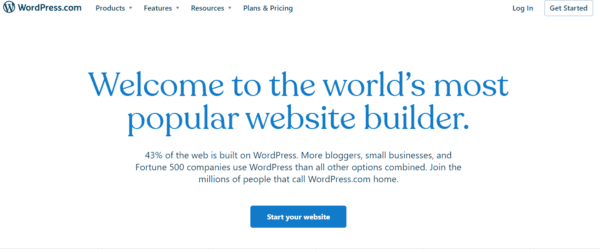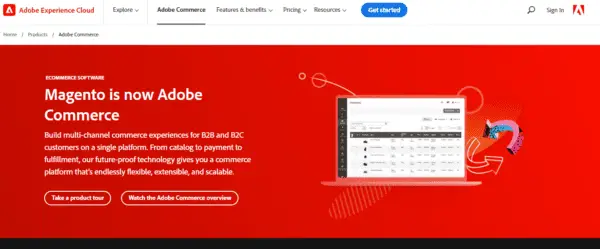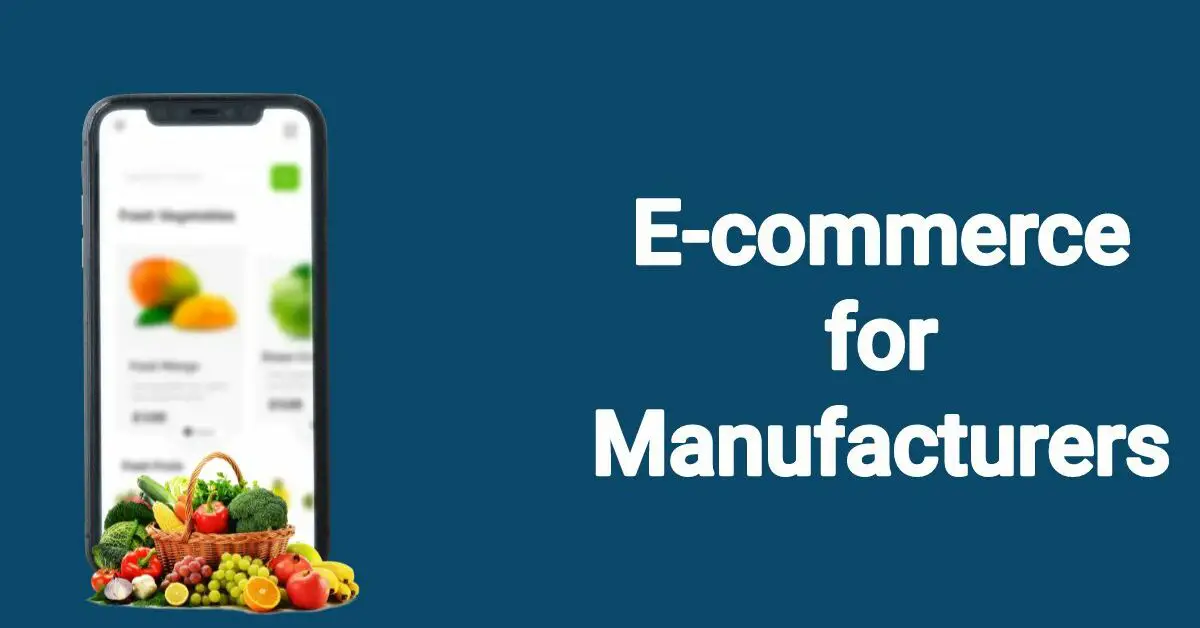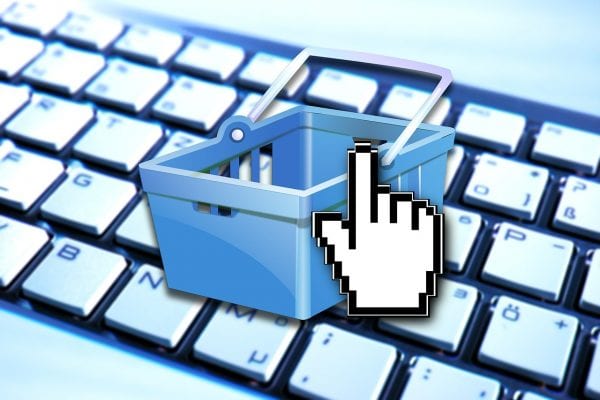Manufacturers need e-commerce to help transforms their businesses with high product visibility and
enhanced customer relationships. After the Covid 19 pandemic, most manufacturers are catching on
that the use of e-commerce is a necessity if they want their business to grow. They notice that
manufacturers, wholesalers and retailers who invest in E-commerce for Manufacturers are experiencing higher profits than their competitors who don’t have a full-function eCommerce website. With the right B2B eCommerce platform, manufacturers can develop best practices for reducing order costs, simplifying complex processes and increasing order accuracy and generating more revenue.
In this article, we are going to discuss the ways e-commerce platforms can benefit manufacturers.
Why should Manufacturers Invest In E-Commerce?
The B2B market has dramatically shifted due to the increasing popularity of eCommerce. In fact, according to Statista, over two billion people purchased goods or services online in 2020, and during the same year, e-retail sales surpassed 4.2 trillion U.S. dollars worldwide. And by 2023, e-commerce will account for more than $6.5 trillion in sales, representing 22% of all global retail sales. This means that manufacturers can capitalize on customers’ desires for digital solutions like improving the accuracy of orders, 24/7 access to order history and account management, more efficient digital processes, among many others.
The reason why e-commerce is important is because of its potential to transform the nature of the manufacturing industry. E-commerce in manufacturing is a platform that enables manufacturers to move away from their traditional business models and embrace a digitally connected ecosystem of customers, internal teams, data, and systems that they manage through a single platform.
Manufacturers that are able to capitalize on customers’ desires for digital solutions will see significant ROI. In fact, statistics show evidence that manufacturers who provide B2B clients with elegant, easy-to-use interfaces see an average 30% increase in spending.
Benefits of e-commerce For Manufacturers
1. It offers Brand Awareness

According to Statista, over two billion people purchased goods or services online worldwide in 2020. These statistics show that a lot of people are shopping online through different e-commerce websites. E-commerce can help manufacturers with brand awareness and recognition. Brand awareness and recognition can be achieved by running Ads(Google or social media ads) to promote your products. Effective customer service solutions. Statistics show that about 86% of buyers are willing to pay more if they have a good experience with your business and a global Customer experience study shows that 74% of senior executives believe that customer experience influences the customer’s willingness to become loyal customers. Strategic on and off-page SEO can also help you increase brand awareness. Customer reviews, testimonials and social media presence are also good ways manufacturers can use to increase brand awareness and recognition through e-commerce platforms.
2. More Access to a Larger Range of Customers
According to Oberlo, 92.2%of internet users visit online stores, 81.8% carry out online searches for a product or service to purchase, and 78.6% follow through with their purchases. Another statistic shows that nearly half of all B2B consumers use the internet to research products or services or find a particular solution to a problem. Furthermore, 62% prefer to access information online in comparison to 27% who prefer offline channels.
The above statistics show that there are a lot of people out there looking for the product or services that you offer. For manufacturers, this is a great opportunity to market to a larger range of people.
Having access to wider customers can help manufacturers have direct access to targeted markets, and customer data for personalization and increase customer loyalty through on-brand retention campaigns. Also, it helps manufacturers gain direct customer feedback which leads to the improvement of products or services for the betterment of the customers.
3. Better analytics
By collecting and analyzing data, manufacturers can have access to in-depth information and data which can be used to improve their business, increase conversion rate, lead generation and drive more sales. Analytics can also help manufacturers personalized customer recommendations and relevant sales precautions to build more accountability and strength in a B2B organization. When setting up your e-commerce online store, there is a need for you to activate analytics, search engine optimization, and digital feedback generators. These are key performance indicators (KPIs) that are used for productive insights and survival guidance in your targeted market.
4. Improved efficiencies.
Most B2B manufacturers need strategies to reduce production costs and bring about positive commendable increments in ROI. Making use of some e-commerce tools can help reduce transaction costs by streamlining supply-chain management and distribution. Automation, Artificial intelligence, and other sections of online selling enable customer service fulfilment with ease, while other e-commerce activities are optimized. Also, by automating payments and setting up recurring billing for regular re-ordering you can reduce the time wasted on chasing invoices. Also using an effective Order management system(OMS) can help you manage large orders instead of recording them manually.
Ecommerce Strategies That Can Help The Manufacturing Industry
1. Having a Website
A website is a place where your customers can come to learn about your product and services. The first thing is to make sure that your website is user friendly and responsive to mobile devices. This offers an optimal version of your website for each device that your visitors use (tablets, smartphones, Ipads etc). The website adjusts automatically to fit the screen of the device the customers are using thereby providing them with an exceptional onsite experience that is void of any rendering issues. Ensure you have a robust user experience for mobile users. Also, make sure that your website meets the mobile-friendliness of requirements of search engines.
Also, prioritise intuitive navigation, easy-to-search product catalogues, detailed listing and secure checkout. Set up a user-friendly self-service portal for rapid re-ordering.
2. Train and equip Your Ecommerce Customer service Team
Customer service is very essential to the success of your e-commerce business. By creating and sponsoring customer training programs and initiatives for your employees, you enhance their skills and educate them about your company’s product services and target market. This will improve how they interact with customers. Statistics show that B2B buyers will likely engage with a salesperson when researching a product with complex configurations or when asking about special prices and Inquiring about specific terms. Training your customer service team improves how well they interact with customers. Your customer service team are the first people customers will interact with. These people create a lasting impression on your brand or business. Your team should have a deep knowledge of your business and product because that is what your business is all about. Also, training your customer service team on customer service etiquette like empathy, patience and problem-solving can promote your brand and help build a strong relationship with customers.
3. Optimizing the website for easy ordering and reordering
It is very important to offer a user experience that facilitates the ordering and reordering processes for your customers since the main objective of your B2B eCommerce website is to drive conversion. This can be achieved by simplifying the pricing structure which allows for easy implementation of product configuration and payment processing. You can also configure product display and pricing according to the client company’s business rules. Furthermore, you can offer personalization by capturing interactions with customers both on and off the eCommerce platform. This can be done through an opt-In form, via customer service or LiveChat.
4. Leverage E-commerce Tools
Another strategy for manufacturers is to leverage various e-commerce tools available to them. Various e-commerce tools can make your e-commerce marketing process easier and more efficient. Tools like the Order Management System(OMS) helps e-commerce businesses track sales, orders, inventory, and fulfilment. Consider an Order Management Solution (OMS) to handle your orders more productively and generate higher profits. Tools like the Customer relation management tools help e-commerce businesses manage customer relations. CRM tools were developed to make the process of customer management easier and less time-consuming. LiveChat tools allow customers to get instant answers without leaving your website. LiveChat can increase the speed of customer interactions. They give you an option to respond to customer queries instantly or offer assistance as soon as they show interest.
5. Know Your Competition
Another strategy manufacturers can leverage for their e-commerce business is to research their competitors. Researching your competitors can give you an insight into what your competitors are doing. You can always research what’s working for them and what’s not. Knowing this will help you know how you can run your e-commerce business effectively. Research things like products, price tags, payment integrations and other important elements that will help your e-commerce business run smoothly. As you build out your eCommerce strategy, you must evaluate your competition and see how your online experience stacks up.
Best E-commerce Platforms For Manufacturers
When manufacturers are choosing their e-commerce platform there are some basic things to consider. They are
- An easy to use platform
- SEO friendly
- Easy integrations with your other marketing tools
- Cost of the platform
1. WordPress

WordPress is the most popular website platform in the world. Statistics show that about 28% of all e-commerce websites use WordPress to host their e-commerce site. With WordPress, you don’t have to pay to use their basic technology. It comes with various free themes that you can install to start building your e-commerce website. It also comes with the WooCommerce plugin which you can install to transform your website into an e-commerce store.
2. Shopify

Shopify is another e-commerce platform that is made specifically for e-commerce websites or stores. It is very powerful and well equipped. The beauty about Shopify is that it offers online retailers including manufacturers a collection of extensions, plug-ins and themes for building online retail stores. Also, Shopify allows you to keep your inventory and customer data clear.
It also comes with useful plugins and themes that can be installed to give your website a professional look.
3. Magento

Magento is another eCommerce platform that manufacturers can use to host their e-commerce platform. The platform supports over 260,000 online stores worldwide. It comes with various functions and extensions and integrates with various CRM, ERP, chatbots and other enterprise-level software. Magento provides unlimited customization options to online vendors. It also offers them over 9,000 extensions and plug-ins for powering their websites.
4.BigCommerce
BigCommerce is a well-known e-commerce platform that helps manufacturers build and maintain their websites. BigCommerce currently powers over 55,000 online shopping sites. It is used by large brands like Toyota, Burrow, and Skullcandy.
They have a powerful and highly-flexible website editor and customizable templates. You can also edit all their HTML and CSS code. It integrates a lot of important e-commerce solutions like LiveChat, CRM into its CMS. They have advanced SEO features, sales analytics, and a suite of social media-focused marketing tools.
5. WooCommerce
WooCommerce is an e-commerce plugin available on WordPress that manufacturers can install on their WordPress websites. The Woocommerce plugin transforms into an e-commerce store. It comes with a large number of free extensions and themes that make it attractive to e-commerce store owners. Furthermore, it also supports multiple payment methods which is an essential part of any eCommerce store.
Best Ecommerce Tools For Manufacturers
Ecommerce tools are tools and software that can make the process of your e-commerce marketing easier, more efficient and time-saving. Making use of e-commerce tools can help you reduce cost, save time and ultimately generate sales.
Some basic e-commerce tools include:
1. Marketing automation
Marketing automation tools allow e-commerce businesses to reach more prospective customers with less effort. Ecommerce marketing automation’s benefits include reduced staff costs, improved accountability, and more consistent marketing of creative content. With the right marketing automation tool, you can target customers with automated messages across emails, websites, social media, and other channels.
Some e-commerce tools manufacturers can use for their e-commerce business include Hubspot, Omnisend, Mailchimp, Sender, Activecampaign, among others.
2. Live Chat Tools
Customers want their questions to be answered immediately and if they don’t get their desired response, they will leave your site or abandon their carts. A live chat tool can help you respond to customer queries instantly and convert them to loyal and paying customers. This tool can help you increase the speed of customer interactions and also give you the opportunity to reply to customers instantly on your website.
Examples of live chat tools include Livechat, Hubspot, Chatbot, Sendinblue, etc.
3. CRM Tools
A Customer Relation Management tool lets you store customer and prospect contact information, identify sales opportunities, record service issues and manage marketing campaigns. With CRM technology, you can track and examine every interaction and communication you have with your customers. Furthermore, CRM ensures simplicity, security, and scaling of customer interactions.
Some CRM tools you can use to optimize your customer experience include Zendesk, BIGContacts, Zoho, HubSpot, Monday.com and so on
4. Order Management Tools
An e-commerce order management system is simply the process of tracking orders from the initial purchase transaction, through the entire fulfilment process, to the point a customer receives their goods. It is a platform that helps e-commerce businesses track sales, orders, inventory, and fulfilment. An order management system helps e-commerce businesses manage and automate their online store order fulfilment process.
Examples of e-commerce order management systems include Veeqo, Brightpearl, Netsuite, Zoho, Magento and many more.
Conclusion
With the rise of technology and the internet coupled with the Corona Virus pandemic, the manufacturing industry is changing from its manual way of marketing to automation to keep up with the modern world. E-commerce has helped the retail industry tremendously and manufacturers are starting to see the benefits and explore how they can benefit from eCommerce. Implementing an effective platform that fits your manufacturing business will help your company by reducing costs, increasing efficiency and allowing you to remain relevant amongst your evolving workforce and customer base.






